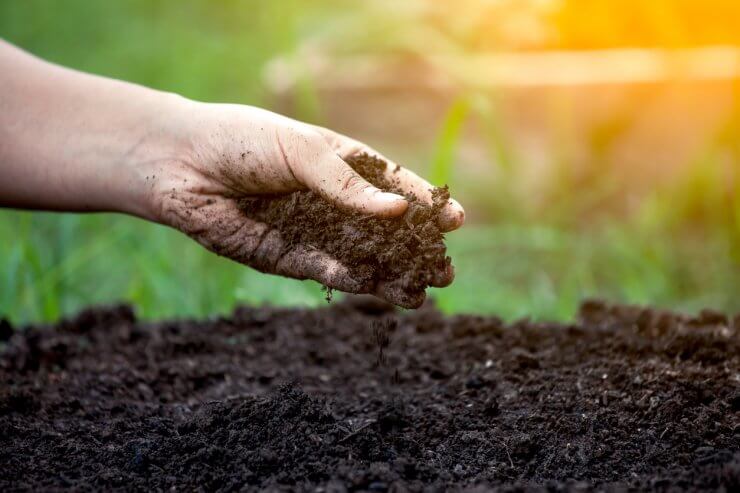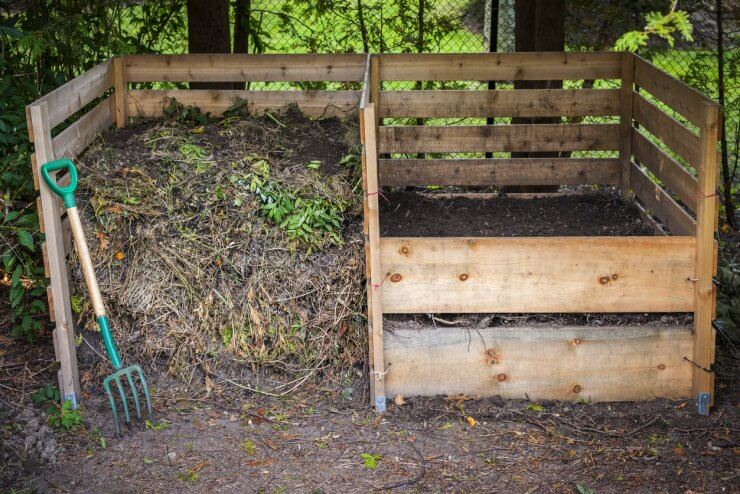
If your idea of a fun afternoon is reading academic research papers, just Google “Salmonella in compost.” You’ll get titles like Cascading effects of composts and cover crops on soil chemistry, bacterial communities, and the survival of foodborne pathogens. To be fair, there is some pretty interesting information in the paper; I’m even using some of it in what you’re about to read. But reading about E. coli, Salmonella, Listeria, and other pathogens is not really what I might call “fun.”
As gardeners, though, we can’t ignore the possibility of Salmonella in compost. Don’t get too stressed out! It’s not all that common. Still, I’m guessing it’s not something most of us want to contend with. But does compost hide a dastardly bacteria that is out to make us sick?
Discover 7 top tips for growing, harvesting, and enjoying tomatoes from your home garden—when you access the FREE guide The Best Way to Grow Tomatoes, right now!

What is Salmonella?
As far as bacteria go, Salmonella is kind of notorious. Certain strains of the bacteria cause typhoid fever! Don’t worry, though. That’s not what you’re going to find in your backyard garden.
Your “basic” Salmonella can cause diarrhea, fever, stomach cramps, nausea, vomiting, or headaches. Salmonellosis, as the illness is known, may appear anywhere between six hours to six days after infection, and symptoms generally last less than a week. The Centers for Disease Control and Prevention (CDC) says that most people recover with rest and plenty of fluids, though more severe cases may require hospitalization.
Where does it come from? You might not like this answer. It’s kind of gross. The CDC says that “Salmonella live in the intestines of people and animals,” and that it is “usually transmitted to humans by eating foods contaminated with small amounts of animal feces.”
I told you it was gross! This is why it’s important to wash your hands like 7 billion times while you’re cooking. In all seriousness, hand-washing and keeping your food prep areas clean are two of the best things you can do to prevent contamination. Let’s get back to the garden, though.
Yikes! Is there Salmonella in compost? I’m about to put that in my garden!
There’s a lot I could say about compost. There’s even more I could say about using manure as compost. Compost can do wonders for any garden. And when you cure it and compost it correctly, some kinds of manure can be nutrient-rich amendments to your soil. The trick with either of these, however, is that they need to be fully composted or cured.
Back to that research paper I mentioned…, it appeared in the Journal of Applied Microbiology, and there is a lot of information in there. I’d recommend reading it if you want to take a deep dive into soil chemistry, pathogens, and farming practices. Here’s the very abridged conclusion:
Adding compost to your soil, including manure, can improve soil health to the point of inhibiting the growth of pathogens. “Proper composting techniques are known to reduce pathogen populations in biological soil amendments of animal origin, which can reduce the risks of introducing pathogens to farm fields in soil amendments.”
In other words, when your compost “cooks” for long enough and gets hot enough, that can kill much of the Salmonella in compost. And as you add compost and improve soil health, it becomes more and more resistant to these dangerous bacteria.
The University of Arizona Cooperative Extension Program agrees that compost and animal manure can be “exceptional organic soil amendments and fertilizers.” They offer a few tips to ensure the safety of any manure you may use.
- Don’t use fresh manure in your food garden, as it often contains E. coli, Salmonella, and other pathogens.
- Let your manure cure for two to four months before you use it.
- Incorporate any manure into the soil, so it doesn’t come into contact with plant leaves, fruits, and vegetables.
- Try to add manure after the harvest, or at least 120 days before you harvest any vegetables.
Of course, you can always skip the manure and compost your vegetable scraps, egg cartons, coffee grounds, tea bags, and eggshells.
The point is that Salmonella in compost, at least for home gardens, isn’t terribly hard to avoid. Use care in deciding where to get your compost, especially if it contains manure. If you do your own composting, make sure it gets hot enough to kill any bacteria and be sure it’s finished before you use it.
Have you had any issues with your compost or other problems with pathogens in your garden? How did you handle it?
Discover 7 top tips for growing, harvesting, and enjoying tomatoes from your home garden—when you access the FREE guide The Best Way to Grow Tomatoes, right now!





The best way to prevent salmonella is to prevent rats and mice as these are the rodents which spread these diseases. Mostly keeping our place clean will do the job. Clearing the food waste and garbage is also a good way to keep these rodents away. If the infestation is more than best to go for pest control services.
Has anyone used the bokashi method to create compost? I have made by own bokashi and it works great and breaks down the food heaps faster
I have a dual-barrel composter too. I am getting little flies in mine. Is that a bad sign?
Try increasing the frequency that you are turning or mixing your compost. This may help to discourage flies from laying eggs.
I’m not sure how to make a compost pile correctly. I have made a pile of good left over but i
Not sure what I’m doing
I’m not sure how to make a proper compost pile
Put layers… vegetable scraps, cut grass, and other greens, a brown layer like cardboard or brown paper, other easily broken down papers, then a bit of soil. Repeat. Turn in over every so often. That’s what I do anyhow. Don’t put citrus, or any animal products. Depending on your zone, it’ll take months to a year to break down. I live in zone three, north in Canada, so my compost is best after two years. I hope you’re somewhere warmer.
Is there a testing kit that gardeners can use ?
I haven’t found one that tests for salmonella. I’d love to hear what other readers have found, if something exists!
I’m with Amanda and Michele! I compost but it never gets hot. Composting that I do is in round black plastic containers with holes all around. It does break down but only the 3rd lower part. I do turn it, added composting enhancements, but haven’t seen any difference.
Thankyou for clearing the doubts on salmonela and composting. Its helpful Gardening Ideas
Same here. I have a dual-barrel composter that never seems to get hot and takes forever to compost.
I would like to see an article on “How to get your compost to HEAT up”. Thank you.
Great idea! I’ll put that on the calendar.
Where can I find this article?
Hi, we wrote about it here: https://foodgardening.mequoda.com/daily/composting/compost-not-heating-up-ways-to-fix-slow-composting/
I agree – that would be very helpful to me as well.
Agreed!